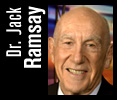 | |
 |

|
| Thursday, February 6 Updated: February 7, 4:35 PM ET All-Star Coaching 101: Roll the ball out By Dr. Jack Ramsay Special to ESPN.com |
||||||||||||||||||
The prevailing attitude among the players seems to be: "You show me your best stuff, and I'll show you mine." There's not enough practice time for a coach to incorporate any kind of team offense or defense. Consequently, teams fast break, then use a couple of basic sets in half court that evolve mostly into screen-and-roll plays. Defensive concentration is generally reserved for the final minutes, but the D becomes intense if the game is close. The coach's role is to organize a simple game plan -- make substitutions and give all 12 players a chance to play -- while maintaining an awareness of which are playing best together. He'll try to take advantage of mismatches that are beneficial to his team. But overall, there isn't a lot of coaching strategy in an All-Star Game. I coached in only one -- the year after Portland won the title in 1977. That game was also played in Atlanta. The West had better personnel -- Bill Walton, Maurice Lucas and Lionel Hollins from the Blazers were on my squad -- and we built a sizeable lead by halftime. We were still in control at the end of the third, but in the last period, we relaxed, became too one-on-one on offense, and the East came back to beat us.
I contributed to the loss by making a mistake that I never made when coaching my own team. I became too conscious of distributing minutes among my players, rather than finishing the game with my best unit. When I did that, the East immediately gained momentum that carried over even after I put my best players back on the floor. It was a costly benevolence on my part that made me angry with myself. After the game, I bumped into Celtics coaching legend Red Auerbach, who fixed me with an amused stare. Red knew what had happened. He said, "You tried to be Mr. Nice Guy, didn't you?" I agreed that I had. Red laughed and said, "You wouldn't do that with your team ... why do it here (in the All-Star Game)?" Auerbach was right. I said that I'd never make that mistake again -- but I never had the opportunity. Dr. Jack Ramsay, who is an NBA analyst for ESPN, is a regular contributor to ESPN.com. |
| |||||||||||||||||

